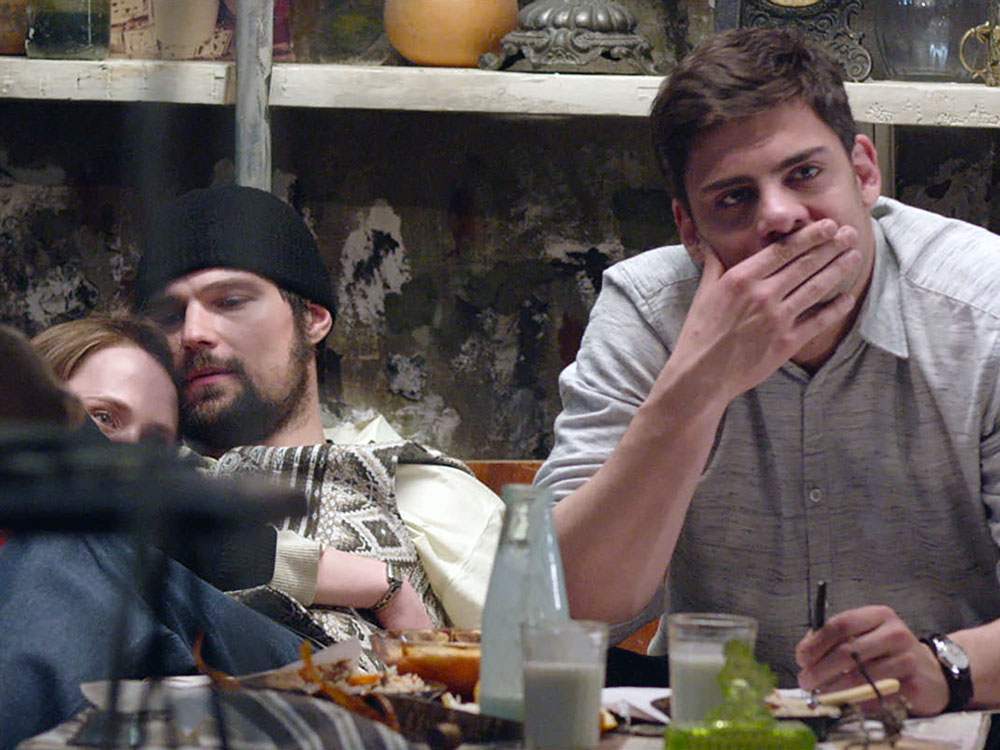ICA is closed from the 30 May – 3 June inclusive.
Césarée, dir. Marguerite Duras, 1978
Il Dialogo di Roma, dir. Marguerite Duras, France 1983, 61 min.
The theme of the film would be a conversation between a man and a woman, a couple of lovers or perhaps a married couple. This is of little importance. There would be no evidence of the couple’s social status, their age, or how long they have been together. The conversation itself would know no starting point, it would follow on from a detail concerning their private lives.
During the lovers’ conversation, all we will be able to see is Rome. I do not want to choose the Rome I am going to show. I would like to choose a route through the city and follow it, no matter what it happens to run into.
As the film unfolds, the difficulty of the lovers’ love, which is an impossibility, will take on a seemingly clearer, more concrete form. Just as Rome, in my opinion, cannot be described or filmed, this difficulty between the lovers can never be known clearly.
Il dialogo di Roma was a commission from the Italian broadcaster RAI. After her short film Césarée, Duras paid another tribute to Berenice, “queen of the Jews”, through the impossible love story between a Roman soldier and the Queen of Samaria. Around the Via Appia and the Piazza Navona, Duras films the landmarks of Rome’s city centre in the early eighties, in dialogue with her own partner, Yann Andréa. On the soundtrack, the 14th of the 33 Diabelli variations play, as in India Song and Godard’s Sauve qui peut (la vie) (1980). *
Preceded by Césarée, dir. Marguerite Duras, France 1978, 12 min.
Composed, as with Les mains négatives, from unused footage originally shot for Le Navire Night, Césarée evokes the city of Caesarea, in Palestine, and Berenice, the "queen of the Jews", "repudiated for reasons of state". Images alternate between fixed shots of statues in the Place de la Concorde, hieroglyphics on the Obelisk, and travelling shots in the Jardin des Tuileries, with particular focus on the statues of Maillol.
The theme of the film would be a conversation between a man and a woman, a couple of lovers or perhaps a married couple. This is of little importance. There would be no evidence of the couple’s social status, their age, or how long they have been together. The conversation itself would know no starting point, it would follow on from a detail concerning their private lives.
During the lovers’ conversation, all we will be able to see is Rome. I do not want to choose the Rome I am going to show. I would like to choose a route through the city and follow it, no matter what it happens to run into.
As the film unfolds, the difficulty of the lovers’ love, which is an impossibility, will take on a seemingly clearer, more concrete form. Just as Rome, in my opinion, cannot be described or filmed, this difficulty between the lovers can never be known clearly.
Il dialogo di Roma was a commission from the Italian broadcaster RAI. After her short film Césarée, Duras paid another tribute to Berenice, “queen of the Jews”, through the impossible love story between a Roman soldier and the Queen of Samaria. Around the Via Appia and the Piazza Navona, Duras films the landmarks of Rome’s city centre in the early eighties, in dialogue with her own partner, Yann Andréa. On the soundtrack, the 14th of the 33 Diabelli variations play, as in India Song and Godard’s Sauve qui peut (la vie) (1980). *
Preceded by Césarée, dir. Marguerite Duras, France 1978, 12 min.
Composed, as with Les mains négatives, from unused footage originally shot for Le Navire Night, Césarée evokes the city of Caesarea, in Palestine, and Berenice, the "queen of the Jews", "repudiated for reasons of state". Images alternate between fixed shots of statues in the Place de la Concorde, hieroglyphics on the Obelisk, and travelling shots in the Jardin des Tuileries, with particular focus on the statues of Maillol.
07:00 pm
Sat, 24 Aug 2024
Cinema 1
07:00 pm
Sat, 07 Sep 2024
Cinema 1
Ticket information
- All tickets that do not require ID (full price, disabled, income support) can be printed at home or stored in email
- For aged-based concession tickets (under 25, student) please bring relevant ID to collect at the front desk before the event.
Access information
Cinema 1
- Both our Cinemas have step free access from The Mall and are accessible by ramp
- We have 1 wheelchair allocated space with a seat for a companion
- All seats are hard back, have a crushed velvet feel and they do not recline
- These are our seat size dimensions: W 42 x D 45 x H 52
- Arm rest either side of the seat dimensions: L 27 x W 7 x H 20
for the following requirements:
- We have unassigned seating. If you require a specific seat, please reserve this in advance
- Free for visitors where ticket prices are a barrier, please email
All films are ad-free and 18+ unless otherwise stated, and start with a 10 min. curated selection of trailers.
Members+ and all Patrons gain free entry to all cinema screenings, exhibitions, talks, and more.
Join today as a Member+ for £25/month.











no. 236848.